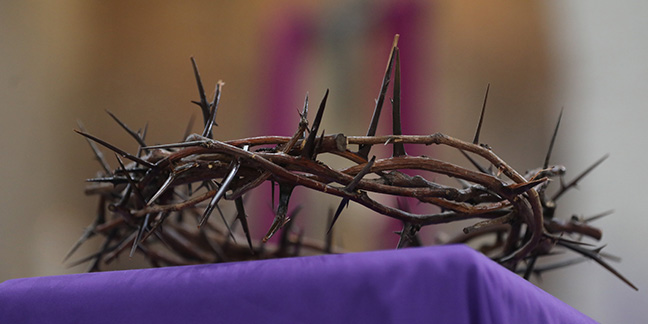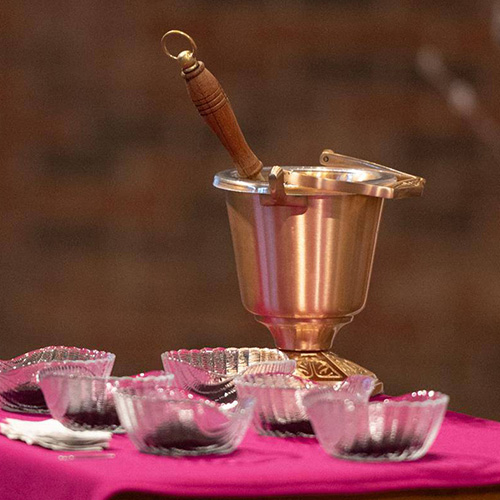 St. Thomas Aquinas speaks of two basic movements of the will in his epic work, the “Summa Theologica”: to seek the absent good and to rest in the possessed good.
St. Thomas Aquinas speaks of two basic movements of the will in his epic work, the “Summa Theologica”: to seek the absent good and to rest in the possessed good.
Our wills are naturally drawn to the good, and if we recognize a good we lack, it’s normal to desire it. If we recognize a good we already possess, it is right that we should enjoy and appreciate it. It’s fairly easy for us modern people to do the first. We’re very adept at busying ourselves in the pursuit of goods, real or perceived. The second part of Aquinas’ equation – resting in the good – seems much more elusive to us.
We spend much of our lives seeking after various goods, such as wealth, security, friendships, health, knowledge or holiness. Our work, our relationships and even our hobbies are often about reaching new levels, obtaining goals or otherwise acquiring something we lack. Even on vacation, we can be so focused on pursuing an experience that we forget to simply rest.
‘In our quest for the next best thing, do we fail to appreciate what we already have?’
There is clearly nothing wrong with having goals and working to better ourselves. This side of heaven, there will never be a shortage of absent goods for us to seek. I’ve mentioned many secular goods already; wealth, health and security. But the same holds true for spiritual goods. There will always be a virtue in which we can improve. We can always stand to increase our devotion and charity. We can always move a little closer to God on this pilgrimage of life.
But in all our efforts to acquire absent goods, do we ever take time to rest in the goods we already possess? Are we so concerned with earning new wealth that we don’t consider how to make the best use of what we already own? Are we so focused on optimizing our health to increase our lifespan that we forget to ask what our life is for? In our quest for the next best thing, do we fail to appreciate what we already have?
Learning to rest in the good we already possess is a necessary remedy to keep us from being overly ambitious and to foster gratitude for the many blessings God has bestowed upon us.
The power of sabbath
In his recent book, “The Great Story of Israel,” Bishop Robert Barron associates Aquinas’ “resting in the good” with the observance of the sabbath. Human beings “will indeed seek any number of absent goods,” he writes, “but the entire purpose of their existence is to taste and to savor the good, to rest in what they have.”
The sabbath rest is modeled after God’s own rest. “So God blessed the seventh day and hallowed it, because on it God rested from all the work that He had done in creation” (Gen 2:3). This divine rest is not the rest of the weary. God is never fatigued. It is a rest that creates space to appreciate the good. “God looked at everything He had made, and found it very good” (Gen 1:31).
For this reason, a major part of Israel’s sabbath observance included the public reading of Scripture, a re-telling of all the good God had done for them. Remembering the blessings they had already received from God was as much a part of Israel’s identity as the hope for a future messiah.
The climax of this regular remembering and resting in the good came each year at Passover, when Israel ritually recalled how God led them from slavery in Egypt to the freedom of the Promised Land. That is a story that the Church also retells every year in the liturgical readings for the Lenten season.
Allow time to rest in Lent
During Lent, we do many things to help us prepare to celebrate the New Passover of Easter, when Christ led us out of slavery to sin into the freedom of God’s kingdom. We fast, we pray, we give alms. These each represent some form of seeking the good – fasting seeks the good of detachment, prayer seeks the good of union with God, while almsgiving seeks the good of serving others.
As important as it is to seek these necessary goods, Lent should also be a time for us to rest in the good we have already received – namely, the great good of Jesus Christ.
Looking forward to celebrating Christ’s resurrection at Easter ought to lead us to look forward in hope to our own resurrection. But consider the goods that we enjoy in Christ even right now: the good of forgiveness of sins, the good of knowing God’s love demonstrated by His sacrifice on the cross, the good of salvation won through Christ’s passion. We have been redeemed from Satan. We have received the unimaginable good of being God’s children, citizens of His kingdom. We have access to God’s holy wisdom to guide our lives.
All these goods and many others besides are already ours. We only lose them by forgetting them.
For catechumens preparing to enter the Church this Easter, Lent is very much a time for seeking an absent good: the sacraments. But for those of us already baptized into Christ, Lent is a time to rest in the good already possessed, to remember our baptismal promises, the grace of being reborn a child of God, sealed in the Holy Spirit and nourished by Christ’s Presence in the Eucharist.
This Lent, as we rightly strive to advance in the spiritual life, let us not fail to remember the great good we have here and now in Christ. Let us remember our story – the story of salvation – and make time each day to rest in that good.
Deacon Matthew Newsome, Catholic campus minister at Western Carolina University and regional faith formation coordinator for the Smoky Mountain Vicariate, is the author of “The Devout Life: A Modern Guide to Practical Holiness with St. Francis de Sales,” available from Sophia Institute Press.
 WASHINGTON, D.C. — Ash Wednesday is March 5 this year. Here are some things to know about Ash Wednesday and the kickoff to Lent:
WASHINGTON, D.C. — Ash Wednesday is March 5 this year. Here are some things to know about Ash Wednesday and the kickoff to Lent:
In the Table of Liturgical Days, which ranks the different liturgical celebrations and seasons, Ash Wednesday ties for second in ranking – along with Christmas, Epiphany, Ascension, Pentecost, Sundays of Advent, Lent and Easter, and a few others. But Ash Wednesday is not a holy day of obligation, though it is a day of prayer, abstinence, fasting and repentance.
Top ranked in the table are the Paschal Triduum – the Holy Thursday Mass of the Lord’s Supper, Good Friday and the Easter Vigil – along with Easter Sunday. Good Friday isn’t a holy day of obligation either, but Catholics are encouraged to attend church for a liturgy commemorating Christ’s crucifixion and death.
Ash Wednesday begins the liturgical season of Lent. There are hymns that speak to the length of the season – one of them is “Lord, Who Throughout These Forty Days” – but Lent spans more than 40 days. So what gives?
“It might be more accurate to say that there is the ‘40-day fast within Lent,’” said Father Randy Stice, associate director of the U.S. Conference of Catholic Bishops’ Secretariat of Divine Worship.
“Historically, Lent has varied from a week to three weeks to the present configuration of 46 days,” Father Stice said. “The 40-day fast, however, has been more stable. The Sundays of Lent are certainly part of the time of Lent, but they are not prescribed days of fast and abstinence.” There are six Sundays in Lent, including Passion Sunday.
Ashes
The ashes used for Ash Wednesday are made from the burned and blessed palms of the previous year’s Palm Sunday.
“The palms are burned in a metal vessel and then broken down into a powder. I believe ashes can also be purchased from Catholic supply companies,” Father Stice said.
“As far as I know, palms from the previous year are always dry enough,” he added. “Parishes normally ask parishioners to bring their palms shortly before Ash Wednesday, so there is no need to store them. People usually like to keep the blessed palm as long as possible.”
Almost half of adult Catholics, 45 percent, typically receive ashes at Ash Wednesday services, according to the Center for Applied Research in the Apostolate at Georgetown University.
During Ash Wednesday services, ashes are marked on the foreheads of the faithful with the Sign of the Cross. The ashes are a symbol of penance and remind us that we are creatures of the earth and mortal beings: “For dust you are and to dust you shall return” (Gen. 3:19).
Alleluia
You might not have noticed, but the use of the word “Alleluia” is verboten during Lent. What is known as the “Alleluia verse” preceding the Gospel becomes known during Lent as “the verse before the Gospel,” with a variety of possible phrases to be used – none of which include an alleluia.
“The Alleluia was known for its melodic richness and in the early Church was considered to ornament the liturgy in a special way,” Father Stice said, adding it was banned from Lenten Masses in the fifth or sixth century.
Fasting
Ash Wednesday also is a day of abstinence and fasting; Good Friday is another. Abstinence means refraining from eating meat; fish is OK. Fasting means reducing one’s intake of food, like eating two small meals that together would not equal one full meal.
“Fasting during Lent followed the example of Jesus’ 40-day fast in the wilderness. It also recalled the 40 days that Moses fasted on Sinai and the 40 days that Elijah fasted on his journey to Mount Horeb,” Father Stice said.
“In the second century, Christians prepared for the feast of Easter with a two-day fast. This was extended to all of Holy Week in the third century. In 325 the Council of Nicea spoke of a 40-day period of preparation for Easter as something already obvious and familiar to all.”
— Mark Pattison, Catholic News Service
More online: Read more about the customs of Ash Wednesday

